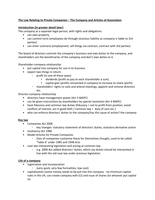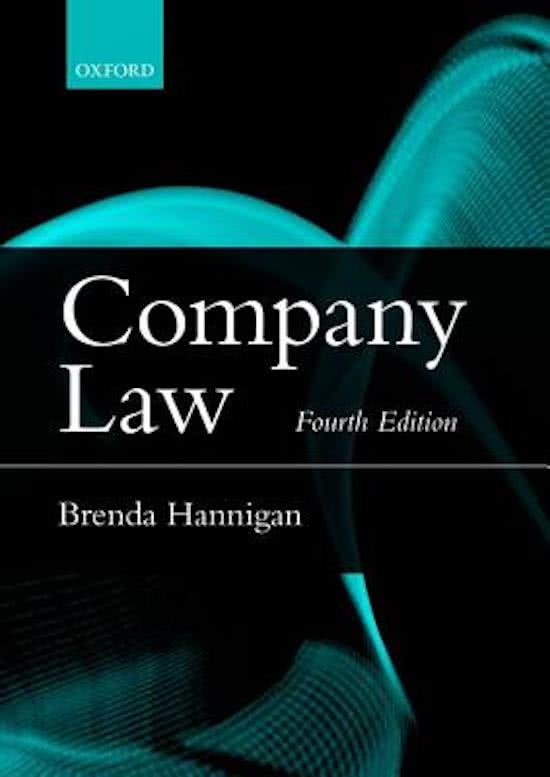The Law Relating to Private Companies – The Company and Articles of Association
Introduction (in greater detail later)
The company as a separate legal person, with rights and obligations
• can own property
• can commit torts (employees do through vicarious liability so company is liable to 3rd
parties)
• can enter contracts (employment, sell things via contract, contract with 3rd parties)
The board of directors controls the company’s business and owe duties to the company, and
shareholders are the beneficiaries of the company and don’t owe duties to it.
Shareholder-company relationship
• put capital into company for use in its business
• expect two things in return:
◦ profit (in one of these ways)
▪ dividends (profit so pay to each shareholder a sum)
▪ capital gain (profits reinvested in company to increase its share worth)
◦ shareholders’ rights to vote and attend meetings, appoint and remove directors
etc.
Director-company relationship
• directors have management power (Art 3 MAPC)
• can be given instructions by shareholders by special resolution (Art 4 MAPC)
• have fiduciary and common law duties (fiduciary = not to profit from position, avoid
conflicts of interest, act in good faith / common law = duty of care etc.)
• who can enforce directors’ duties to the company/has the cause of action? the company
Key law
• Companies Act 2006
◦ key changes: statutory statement of directors’ duties, statutory derivative action
• Insolvency Act 1986
• Model Articles for Private Companies
◦ (lots of companies customise these for themselves though), used to be called
‘Table A’ under 1985 and 1948 Acts
• case law interpreting legislation and arising at common law
◦ e.g. 2006 Act added directors’ duties, which say duties should be interpreted in
line with the old case law under previous legislation
Life of a company
• registration and incorporation
◦ (very quick, very few formalities, low cost)
• capitalisation (some money needs to be put into the company - no minimum capital
rules in the UK, can create company with £2) and issue of shares (to whoever put capital
in)
, • appointment of director(s)
◦ (by shareholders at a general meeting)
• debt finance?
◦ (loans to start operations etc., if don’t have a lot of capital then need directors to
act as guarantors for the loan as security)
• trading: entering into contracts, etc.
◦ directors decide who to contract with
• distribution of profits or reinvestment
◦ directors decide to retain and reinvest or pay out dividends
• disclosure: filing at Companies House and publication of accounts
◦ have to make public disclosures, file about changes of directors etc., rules to
comply with
• success or insolvency
Progression of business forms
• Sole trader
◦ natural person carrying on business on their own account
▪ Pros: no formalities so have privacy
▪ Cons: no separation between business and personal assets, no limited
liability (would have to expressly contract for it)
▪ one person is responsible for paying any damages, which is risky because
they could go bankrupt
▪ pay income tax on income but deduct expenses
• Partnership
◦ 2 or more people carrying on business in common with a view to profit (s1
Partnership Act 1890)
▪ each partner is an agent of the others and can bind the partnership
▪ so have fiduciary duties to each other (e.g. good faith)
▪ not a separate legal entity
▪ Pros: no public registration and disclosure required
▪ Cons: no limited liability unless limited by contract, no separation
between personal and partnership assets, all partners unlimitedly joint
and severally liable for debts of partnership (so have to be constantly
concerned with financial status of partners because a 3rd party can go
after whichever partner has money)
▪ by default partners have equal share and rights (e.g. 50/50), so to reflect
different capital contributions would need bespoke partnership deed and
lawyer from beginning (more complex and onerous)
▪ death or departure of partner will bring to end, so need provision for
succession
• Private Limited Company (ltd)
◦ minimum one director (s154(1) CA 2006 who must be a natural person (s156)
min 16 years old (s157) and one shareholder (s7, s112 CA 2006), no requirement
to appoint company secretary (s270)
, ◦ no minimum capital requirement, cannot offer shares to public
◦ limited liability
• Public limited company (plc)
◦ can offer its shares to the public and raise capital from anyone, whereas private
can only offer shares to closed group of people.
◦ when selling to public also selling control
◦ s763 PLC needs £50k in share capital
◦ more disclosure needed, auditing every 6 months, giving up control of company
(so a question of whether you want to get investment by increased debt as
private company, or selling off equity as public company?)
• listed public limited company
◦ shares traded on stock exchange, value quoted there. Shares are liquid and can
sell immediately for that price.
◦ Listed shares are very similar to cash because there’s always someone willing to
buy them at their price, so shares are more desirable, and you can use those
shares as security because people know you can turn them into cash at the listed
price.
◦ More desirable so people pay more for them, which means the company can get
more money which is important because also selling off control so need to get a
good value in exchange.
◦ So listing as a public company is more desirable because the same shares with
the same amount of control are sold for more (compared to just normal public
company)
◦ Also recognised worldwide so better accessibility to other markets
◦ But onerous to get listed, lots of documentation, needs shareholders’ approval
• Global Corporate Group/Network
◦ parent companies can own shares in other companies (their subsidiaries)
◦ subsidiary defined s1159(1) CA2006: majority of voting rights, right to appoint
board, control of majority votes through contract (e.g. shareholder agreement),
sub-subsidiary (where parent’s subsidiary owns its own subsidiary)
◦ if a company owns 100% shares in a subsidiary, the company can run it in its own
interests, but have limited liability for what that subsidiary does (can be liable for
nothing more than the company put into it)
◦ if has 51% then is majority shareholder but has to pay attention to minority
shareholders
◦ why corporate groups?
▪ asset partitioning (creditors can’t go after assets put into a subsidiary)
▪ tax minimisation/avoidance
▪ business organization
▪ risk management (firewalls between different pools of money)
▪ financing
Other forms of companies (less common)





